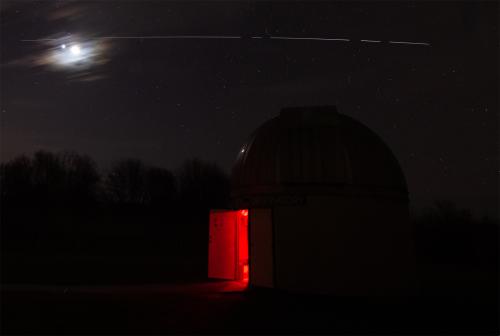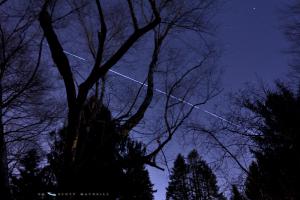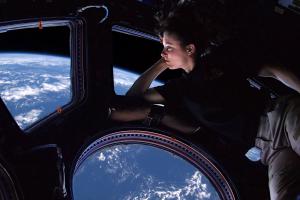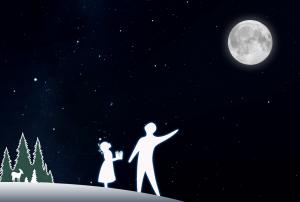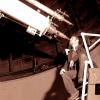Celebration of Space - November 22, 2020
This coming week, we’ll have numerous opportunities to catch a fantastic dance of the planets in the SW dusk sky as Venus and Jupiter, which have been progressively getting visibly closer, will pass by each other. Every night this weekend and coming week, the two planets will appear quite close, though Saturday, November 23rd, and Sunday, November 24th will be their closest visible approach to each other, coming in at just over 1° apart in the evening sky. Thanksgiving Day, which is this coming Thursday, November 28th in the United States, will offer up an added bonus when the 6% waxing crescent Moon joins in the celestial dance! Visibly approaching within half a degree of Venus, and about 4° east of Jupiter, the view will be stunning. Local sunset time is 4:14 pm on Thanksgiving and the conjunction should become fully visible about 15 minutes later. To see it, you will need a good view of the SW horizon. Step outside about 15 - 45 minutes after sunset, and look to the SW, Venus will be the brighter of the two planets, and the Moon needs no introduction. What better way to kick off your day of revelries than with a stunning dance of the Moon, Venus, and Jupiter. So get out and add a little astro-awesome to your party and have a celebratory dance with the Moon, Venus, and Jupiter.
The International Space Station (ISS) has returned to the evening skies over the US, specifically the Northeast, with daily passes happening during the evening hours. Being that we are fast approaching the Winter Solstice, evening passes of the ISS are happening quite early, in the 5:00 pm – 6:00 pm time frame. Additionally, the longer periods of night are allowing for a longer period of evening passes, lasting over three weeks long, with nightly passes continuing over our region until December 14, 2019. To catch a view of the ISS passing overhead, all you need to do is step outside and look up on a clear night. The ISS always starts low on the horizon like a dim moving star, and will increase (significantly) in brightness as it rises higher. The best passes are the ones that pass closest to the zenith (directly overhead). Daily pass times for Southern New England, which are acceptable for the entire Northeast, are published every morning on the Frosty Drew Observatory website. Here are a few notable passes this week:
Sat, Nov 23,at 5:51 pm, starting in the WSW, rising overhead, heading towards the NE and into orbital sunset.
Sun, Nov 24 at 5:02 pm, starting in the SW, rising to 59°, heading towards the SE.
Mon, Nov 25 at 5:51 pm, starting in the W, rising to 34°, heading towards the NNE and into orbital sunset.
Tue, Nov 26 at 5:02 pm, starting in the WSW, rising to 51°, heading towards the NE.
Wed, Nov 27 at 5:51 pm, starting in the WNW, rising to 20°, heading towards the N and into orbital sunset.
Thanksgiving at 5:02 pm, starting in the W, rising to 26°, heading towards the NE.
For those who are wondering, orbital sunset is a product of how we see the ISS in relation to where it is in its orbit around Earth. For an observer to see the ISS, the station needs to be in direct sunlight, when the observer is viewing from a nighttime region. If the ISS orbits out of direct sunlight, the observer will see the station start to dim and fade out of view. During this time, inhabitants of the ISS are experiencing sunset. For them, this happens once every 90 minutes. Take a moment to read up on how the ISS orbits Earth. Then step outside this week and catch a view of humanity’s only continuously inhabited space-based residence, and show off your astro-prowess to your family and friends on the coming holiday by pointing it out in the sky.
This Thursday, as you’re enjoying your time with family, friends, or just your fabulous self; the idea of giving thanks will likely be a topic of discussion or thought. This is a tricky subject because it is different for everybody, and what others may be thankful for is often something that you are not thankful for, and would be happy without. Though common ground can be found in the things that bring us happiness, enjoyment, and inspiration. One such place on my list is the Frosty Drew Observatory and Science Center. It is a place that lifts so many hearts, and inspires gasps, smiles, tears, and an overall awe of the cosmos in so many people. The astronomy team at the Observatory is very carefully recruited and curated to include like minded individuals, all who have a passion for the cosmic perspective, the understanding that we are all part of something much bigger than the local issues of planet Earth. These individuals are dedicated to sharing their knowledge, enthusiasm, and passion with you, and they all do it on a volunteer basis. Being a 501 (c) (3) organization, Frosty Drew relies on donations from the public to survive, awesome people, like you, who are willing to support our mission of inspiring others to reach for the sky. As you close out your year in fabulous celebratory fashion, we are hopeful that Frosty Drew has earned a spot on your list of things that you are thankful for, like it has for me, and consider supporting us with your Giving Tuesday and end of the year donations. There are numerous ways to donate to Frosty Drew as well. You can directly support Frosty Drew financially, or you can support us by selecting Frosty Drew Memorial Fund, Inc. as your Amazon Smile Recipient. Additionally, Frosty Drew Observatory accepts equipment donations. We are always desperately in need of laptop computers, GSM smart phones (uses SIM card), digital cameras, digital storage devices, network equipment, projectors, and display panels (LED, LCD). If you have an older device that fits this description, please fill out our equipment donation form. You will be surprised how much that old gear you have sitting in your closet can help us! Regardless, we love you and thank you for being part of the larger Frosty Drew community.
Have a safe and happy Thanksgiving from all the astro-geeks at Frosty Drew Observatory!
-Scott
- Author:
- Scott MacNeill
- Entry Date:
- Nov 22, 2019
- Published Under:
- Scott MacNeill's Columns

